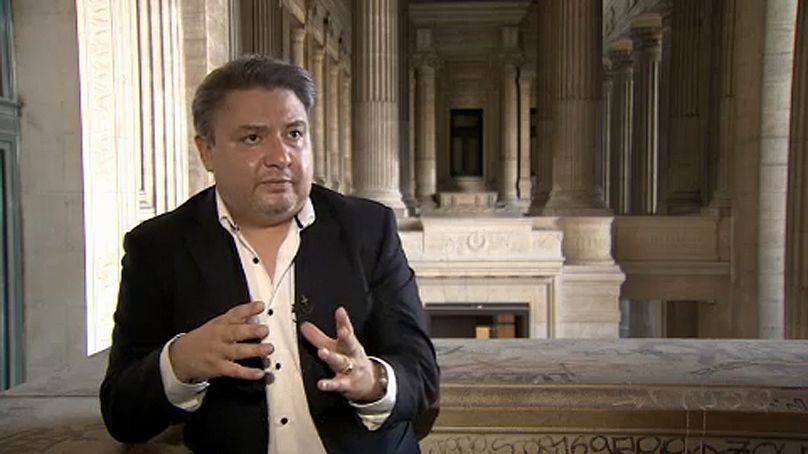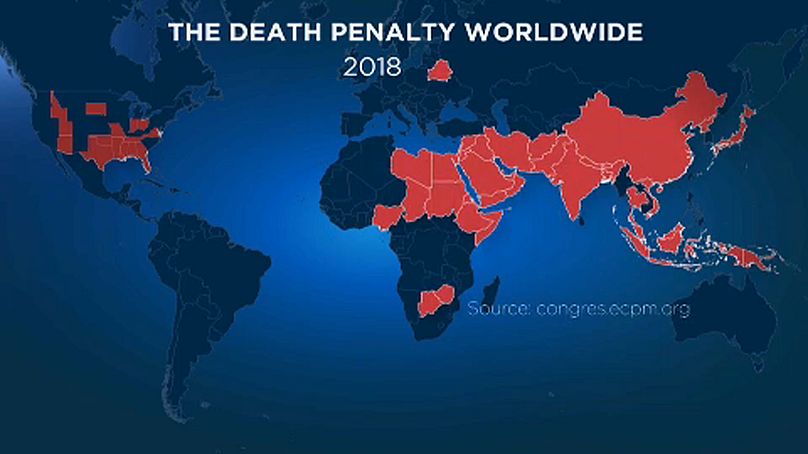European countries have long banned capital punishment, but Europeans can end up on death row around the world, so we look at how Europe can help to abolish the death sentence.
Europeans are still at risk of being sentenced to death. It might sound shocking, but this is exactly what happened to Spaniard Joaquín Martínez.
 ADVERTISEMENT
ADVERTISEMENT
 ADVERTISEMENT
ADVERTISEMENT
He ended up on death row in Florida for three years with the accusation of a double murder, all because of a judicial error.
"When I was arrested in 1996 I used to trust the American judicial system and I was sure that the court would have declared my innocence. But the case was very sensitive and they had to find a scapegoat for the killing of a famous police chief's son", he explained.
Joaquin's story mobilized the international community: the King of Spain, Pope Jean-Paul II, and the European institutions made an appeal to the court to revise the death sentence and provide him with a good attorney.
The international pressure played a big role in the appeal, where the Florida Supreme Court remanded the case for retrial. Thanks to a crowdfunding campaign, Joaquin's family managed to raise money to pay a good lawyer who was able to add new alibi testimony and prove prosecutorial misconduct and other mistakes made during the investigation.
Finally, Joaquin was found not guilty and acquitted in 2001, but this experience marked his life forever.
“It is not enough to be innocent,” he affirms. “You need to have a good team of attorneys, you need to have enough money for resources, you need to have media behind you and institutions behind you".
You might be surprised to know that before being sentenced to death, Joaquin was a fervent supporter of the death penalty.
"I thought that it would heal the victim's families, their pain of seeing their loved one killed. By seeing the murderer's execution they could close a chapter and feel relieved. But what really changed my perception of the death penalty was seeing the faces of those in the death row and also the faces of their families, the other victims that are never spoken about”.
After his release, Joaquin embarked into a campaign to raise awareness about capital punishment. He was at the European Parliament in Brussel this week, for the 7th world congress against the death penalty, organized by "Ensemble Contre la Peine de Mort" (ECPM).
146 countries and territories have abolished the death penalty either in law or in practice as of 2018. Abolition is part of a universal trend. And yet, some regions still strongly resist the advance of abolitionist thinking and continue to apply the death penalty in a significant way.
This is the case in Asia, Africa, the Arab world and the United States, the only democracy among the ten leading countries in terms of the number of annual executions.
The world number of executions in 2017 is estimated at 993. This figure is well below the reality, given that China has made data on executions, estimated to be several thousand per year, a State secret.
Pressure or culture shifts seem to be taking root starting across the Mediterranean: the African continent is moving towards abolition as four-fifths of African countries got rid of the death penalty.
While European countries have abolished the death penalty decades ago, the EU could lead the way to urge the international community to stop capital punishment.
MEPs suggest linking EU funding available under the so-called Cotonou agreement to the abolition of capital punishment in African, Caribbean and Pacific countries.
But this agreement between the EU and ACP countries, that sets conditions for trade and cooperation, has also been heavily criticized.
For Klaus Buchner, German MEP and member of the Human Rights Committee, including a new condition between EU funds and human rights compliance will not be that easy.
“That should be done in any case but Cotonou agreement is not at all favorable for the countries it is concluded with. They have to accept unlimited imports from Europe, with respect for example of milk powder, meat and so on, and that has already destroyed their agriculture. So I understand that the governments are hesitating to accept additional conditions”.
The agreement is due to expire on 29 February 2020 and the new agreement is currently under negotiations. The question is if the next European Commission will set human rights as its priority.













